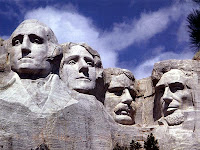 Abraham Lincoln is arguably the greatest president and transformational leader in US history. Having presided over the Union’s victory over the Confederacy, Lincoln nevertheless called for national reconciliation. The definitive statement of Lincoln’s gracious generosity of spirit is encapsulated in his Second Inaugural Address.
Abraham Lincoln is arguably the greatest president and transformational leader in US history. Having presided over the Union’s victory over the Confederacy, Lincoln nevertheless called for national reconciliation. The definitive statement of Lincoln’s gracious generosity of spirit is encapsulated in his Second Inaugural Address.Delivered March 4, 1865, just over one month before the end of the Civil War, this speech exemplifies Lincoln’s transformational leadership ability:
Fondly do we hope, fervently do we pray, that this mighty scourge of war may speedily pass away. Yet, if God wills that it continue until all the wealth piled by the bondsman's two hundred and fifty years of unrequited toil shall be sunk, and until every drop of blood drawn with the lash shall be paid by another drawn with the sword, as was said three thousand years ago, so still it must be said "the judgments of the Lord are true and righteous altogether."
With malice toward none, with charity for all, with firmness in the right as God gives us to see the right, let us strive on to finish the work we are in, to bind up the nation's wounds, to care for him who shall have borne the battle and for his widow and his orphan, to do all which may achieve and cherish a just and lasting peace among ourselves and with all nations.
Lincoln set the United States on the trajectory we follow today and transformed our nation.
Transformational leadership, according to author Peter Northouse, “engages with others and creates a connection that raises the level of motivation and morality in both the leader and the follower.”
 Mount Rushmore depicts four presidents who were great transformational leaders. George Washington, the father of our country, set the standard for presidential leadership. Thomas Jefferson presided over a peaceful transfer of power and enlarged the national territory. Abraham Lincoln saved the union and bound the nation’s wounds. Theodore Roosevelt projected national authority both for strong foreign policy and progressive reforms.
Mount Rushmore depicts four presidents who were great transformational leaders. George Washington, the father of our country, set the standard for presidential leadership. Thomas Jefferson presided over a peaceful transfer of power and enlarged the national territory. Abraham Lincoln saved the union and bound the nation’s wounds. Theodore Roosevelt projected national authority both for strong foreign policy and progressive reforms.These presidents were prominent political transformational leaders. But many men and women in other positions are also transformational leaders: parents, pastors, coaches, civic leaders, and teachers. I’ve blogged about two of my favorite transformation leaders, Dennis Kinlaw and Roy Lauter.
Who are your favorite transformational leaders? And how are you being transformed?
No comments:
Post a Comment